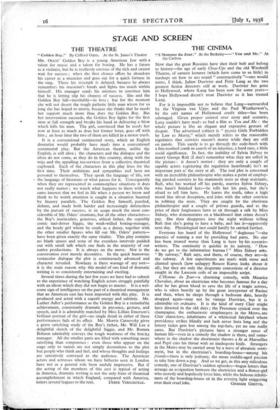STAGE AND SCREEN
THE THEATRE
" Golden Boy." By Clifford Odets. At the St. James's Theatre MR. ODETS' Golden Boy is a young American Jew with a talent for music and a talent for boxing. He has a future as a violinist, but he is restlessly envious of the rich and cannot wait for success ; when the first chance offers he abandons his career as a musician and goes out for a quick fortune in the ring. There his triumph is delayed, because he always remembers his musician's hands and fights too much within himself. His manager sends his mistress to convince him that he is letting slip his chances of success. She and the Golden Boy fall—inevitably—in love ; but for the moment she will not desert the tough pathetic little man whom for so long she has hoped to marry, because she thinks that he needs her support much more than does the Golden Boy. But her intervention succeeds, the Golden Boy fights for the first
• time at full strength and breaks his hand in delivering a blow which kills his man. The girl, convinced that he needs her now at least as much as does her former lover, goes off with him ; an hour later the two of them are killed in a motor crash.
It is a conventional sentimental story, which an English dramatist would probably have made into a conventional sentimental play. But the American theatre, unlike the English, is still alive ; the characters and the dialogue and the ideas do not come, as they do in this country, along with the wigs and the appalling tea-services from a collective theatrical cupboard. Each of the characters in this play lives for the first time. Their ambitions and sympathies and lusts are personal to themselves. They speak the language of life, not • the language of literature or what passes for it. Consequently when they are represented in commonplace situations it does not really matter ; we watch what happens to them with the same interest that we feel in life when a person we know and think to be worth attention is caught in a situation haunted by literary parallels. The Golden Boy himself, puzzled, defiant, and made both harder and increasingly defenceless by the pursuit of success, is in scope much the most con- siderable of Mr. Odets' creations, but all the other characters— the Boy's inarticulate, generous, ethical father, the superbly comic taxi-driver Siggie, the weak-willed boxing-manager, and the heady girl whom he sends as a decoy, together with the other smaller figures who fill out Mr. Odets' pattern— have been given exactly the same vitality. This play contains no blank spaces and none of the eventless intervals padded out with small talk which one finds in the majority of our native productions. It is always on the move. No is the conversation ever merely decorative. In the quick humorous vernacular dialogue the plot is continuously advanced and character revealed. Nowhere is there wastage of any sort— it is the main reason why this model of one kind of dramatic writing is so consistently entertaining and exciting.
Several times during the last few years we have had to submit to the experience of watching English actors struggle painfully with an idiom which they did not begin to master. It is a wel- come sign of intelligence on the part of a theatrical management that an American cast has been imported with this play. It is produced and acted with a superb energy and subtlety. Mr. Luther Adler's performance as the Golden Boy is a remarkable achievement, consistently dramatic in presence, gesture, and speech, and it is admirably matched by Miss Lillian Emerson's brilliant portrait of the girl—no single detail in either of these performances fails of its effect. Mr. Morris Carnovsky gives a grave satisfying study of the Boy's father, Mr. Will Lee a delightful sketch of the delightful Siggie, and Mr. Roman Bohnen admirably conveys the tough weakness of the boxing manager. All the smaller parts are filled with something more satisfying than competence : even those who appear on the stage only to vanish are not simply decorations to the plot but people who think and feel, and whose thoughts and feelings are sensitively conveyed to the audience. The American actors and actresses whom we have hitherto seen in London have not as a general rule been unduly impressive. But if the acting of the members of this cast is typical of acting in America, dramatic writing is not the only form of theatrical accomplishment in which England, compared with America,
loiters several leagues to the rear. DEREK VERSC.HOYLE.


















































 Previous page
Previous page